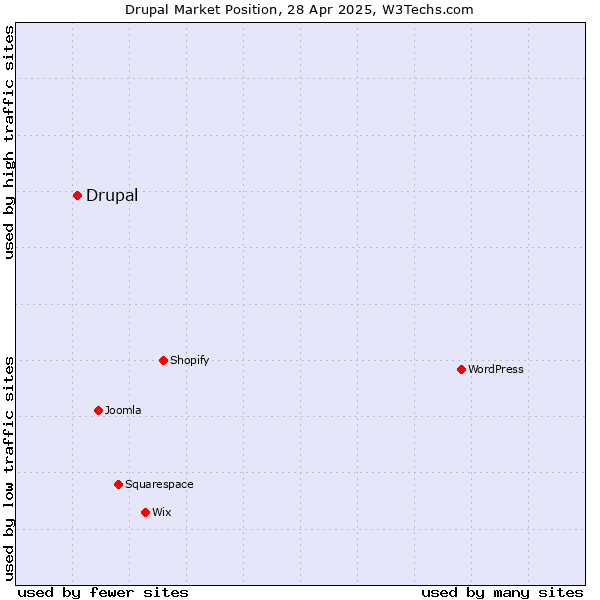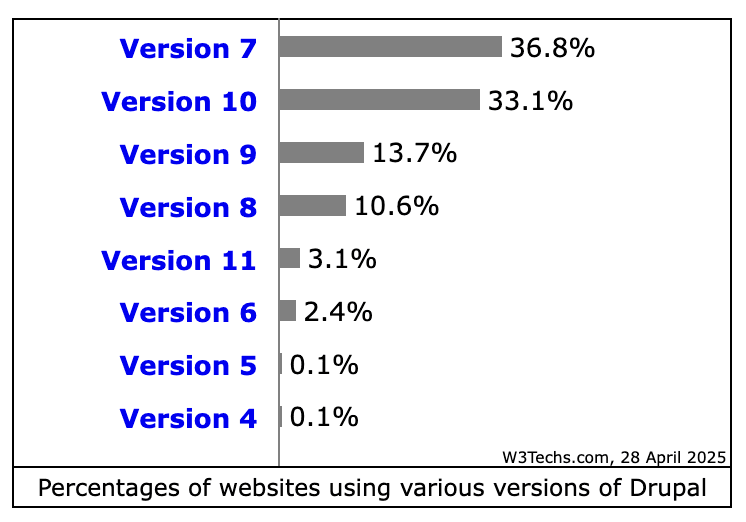For many enterprises, Drupal has been the backbone of their web operations for years. It’s a battle-tested CMS that handles complex content needs with elegance. But business needs have evolved. Today, it’s rare for a company to rely only on Drupal. They are spinning up Python APIs, .NET backend services, Node.js apps, Java microservices — expanding their digital ecosystems around Drupal’s core. Even Drupal projects themselves are now a mix of technologies with decoupled frontend or external dependencies.
Managing this growing tech diversity the old way — with separate hosting environments and disjointed processes — is a fast track to operational complexity. The smart move? Consolidate. Host Drupal and all your new applications together on a single cloud application platform.
Let’s dive into why companies that already rely on Drupal should think seriously about extending their hosting strategy, and how a platform like Platform.sh makes it painless.
Expanding beyond Drupal: the natural next step
Even with the emergence of new CMS solutions, Drupal still shines at powering enterprise-grade websites, portals, and content hubs. But it's rarely the whole story anymore.

Source: https://w3techs.com/technologies/details/cm-drupal
Your data team may be building a Python-driven recommendation engine, or our CRM team is deploying a Springboot Java API. Marketing wants a Node.js headless frontend for innovative UX experiences. New apps emerge fast, and they're often in languages Drupal wasn't built to handle.
The challenge: How do you keep scaling your digital stack without creating a fragmented mess?
Trying to bolt each new app onto its own server, cloud account, or hosting vendor will quickly create silos, duplication, and security nightmares. Instead, the smartest path is to extend your existing Drupal hosting into a unified application platform — one that’s already built for running any runtime or service.
Platform.sh, for instance, doesn't just excel at hosting Drupal (though it absolutely does). It also natively supports over 70 frameworks and languages, letting your Drupal site and your new Python, .NET, or Node.js services live together, with the same governance, security, and deployment flows.
This way, Drupal remains the core of your digital platform, while new services and applications extend its capabilities seamlessly and securely.
Simplified infrastructure management
Managing a Drupal site already comes with enough complexity, including updates, modules, and security patches. Now imagine adding a separate cloud account for a Node.js service, a different container cluster for Python microservices, and a Windows Server for .NET APIs. It's a recipe for sprawl and inefficiency.
With a single cloud platform, your Drupal site and your new apps sit side-by-side. One dashboard, one set of tooling, one bill. Less context-switching for your team, no additional learning curve and less surface area for mistakes.
Platform.sh enables teams to manage their Drupal deployments and their additional services from the same place, using standardized workflows. That’s less cognitive overhead and a lot less time wasted coordinating between fragmented systems.
As Forrester noted in its 2023 Total Economic Impact™ study, companies adopting unified platforms reported major operational streamlining — reducing duplicated infrastructure and tooling overhead by over 40%.
Consistent environments and processes
You already know the pain: Drupal behaves one way locally, another way in staging, and throws curveballs in production. Now multiply that by three if you have Python, .NET, and Node.js apps all hosted differently.
Consistency is king. A cloud application platform ensures that your Drupal environment and your new app environments are defined as code, reproducible from dev to prod. Whether it’s a Django REST API, a Symfony backend, or your main Drupal site — they all deploy with the same principles.
Platform.sh uses a Git-based configuration approach (Infrastructure as code) that ensures every application — Drupal or otherwise — follows a repeatable, predictable path from code to cloud.
Having a deterministic build and deploy pipeline removes “works on my machine” bugs, speeds up QA cycles, and lets your teams focus on building, not firefighting. Bringing peace of mind to the team in charge of deploying and running these applications.
Faster development and deployment cycles
New apps are often born around existing Drupal sites because business teams need features Drupal wasn’t built for: a real-time inventory API, an AI-driven search engine, a mobile-optimized experience.
On traditional hosting setups, adding new services often means provisioning separate servers or cloud accounts, manually configuring environments, and setting up isolated monitoring, security, and compliance controls — a process that can involve multiple teams, approval workflows, and weeks of coordination.
With a cloud application platform like Platform.sh, you can spin up new projects as easily as cloning your Drupal staging site. Want a test environment where your new Python API talks to the Drupal CMS? Click a button. Done.
That kind of speed is a serious competitive advantage. It enables real DevOps practices: feature branching, ephemeral environments, automated tests — not just for your shiny new services, but for your core Drupal site too.
Faster iterations mean faster innovation. Your digital stack stops being a weight and becomes a launchpad.
Cost savings and resource efficiency
Running a standalone Drupal hosting contract, plus a separate cloud subscription for new apps, plus a managed service for a backend API… costs add up. Fast.
By hosting everything — Drupal plus diverse apps — on one cloud application platform, you consolidate spending. You optimize resource usage dynamically across services. And you avoid the hidden tax of managing too many vendors.
Forrester found that organizations consolidating to a platform model (like Platform.sh) achieved a 219% ROI over three years, largely by reducing fragmented infrastructure and IT operating costs.
Plus, teams spend less time maintaining and troubleshooting fragmented systems and more time delivering features — which translates directly into higher business value.
Enhanced security and compliance
Drupal teams are already used to the constant need for patches, updates, and compliance hardening. As we can see, 39.4% of Drupal sites are running an “End-of-Life” version no longer maintained. And only 3% are on the latest one.

Source: https://w3techs.com/technologies/details/cm-drupal
Now add new apps and stacks into the mix, each on their own unmanaged cloud hosting… and both your attack surface and technical debt could balloon in weeks.
A single cloud platform brings your security posture up across the board. Patches, backups, encryption, access controls — all managed uniformly across your Drupal site and every new app you deploy.
Gartner estimates that through 2025, 90% of companies that fail to control public cloud use will inappropriately share sensitive data — mainly due to misconfiguration. A managed cloud application platform greatly reduces this risk by automating the security baseline across all services and adding guardrails to avoid such vulnerabilities
Platform.sh is compliant with major standards like SOC 2 and GDPR, meaning your team inherits those protections automatically across all apps — not just Drupal.
Add 24/7 monitoring support and security teams and all your bases are now covered to avoid a dramatic breach.
No loose ends, no forgotten servers.
Scalability and future-proofing
Your Drupal site is only part of your digital future. New needs will emerge: APIs, personalization engines, mobile integrations, headless frontends.
By building on a cloud platform that embraces multi-language, multi-framework diversity natively, you future-proof your stack.
Platform.sh already supports over 70 languages and frameworks out-of-the-box, from Go to Rust to Elixir. Whatever your next project demands, you won’t need a new hosting partner or a replatforming exercise. You’re ready.
Scaling up is simple too. Whether you need to triple your Drupal capacity for a holiday rush or horizontally scale a Python AI service, it’s the same scalable, resilient platform underneath.
One platform. Infinite growth paths.
Final thoughts
If your company already trusts Drupal for its critical web presence, you’re in a perfect position to evolve smartly.
Rather than patch together new hosting solutions every time a new app pops up, extend your existing investment: Drupal plus everything else, hosted together on a single cloud application platform.
Platform.sh makes this evolution seamless — letting you focus on innovation, not infrastructure firefighting.
The digital future isn’t Drupal alone. It’s Drupal plus the services and apps that will power your next decade of growth.
And you’re better off building that future on a unified foundation.
 Switching to Platform.sh can help IT/DevOps organizations drive 219% ROI
Switching to Platform.sh can help IT/DevOps organizations drive 219% ROI Organizations, the ultimate way to manage your users and projects
Organizations, the ultimate way to manage your users and projects







